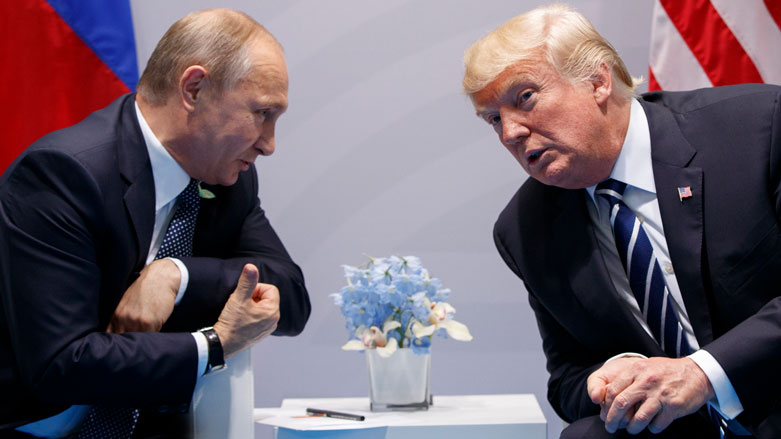Putin dampens tensions, as US, French, UK strike on Syria looms

WASHINGTON DC (Kurdistan 24) Russian President Vladimir Putin responded with an appeal to “common sense” on Wednesday after US President Donald Trump said in an early morning tweet, “Get ready Russia, because [US missiles] will be coming, nice and new and ‘smart’!”
Trump was apparently responding to a statement by Russia’s ambassador to Lebanon, Alexander Zasypkin.
”If there is a strike by the Americans,” Zasypkin said, “the missiles will be downed and even the sources from which the missiles were fired.”
Zasypkin spoke in Arabic to Hizbollah’s al-Manar television, and Reuters reported his statement in English, apparently prompting Trump’s tweet.
Despite the bellicosity of the tweet, Russian President Vladimir Putin responded with noticeable calm, making him appear, perhaps, the more careful and responsible of the two leaders.
Speaking to a group of 17 ambassadors—including from Jordan, Egypt, and Saudi Arabia—presenting their credentials, Putin began by flattering them.
“Today, the role of diplomacy and the diplomat has taken on special significance,” the Russian leader said.’
“The situation in the world is becoming more chaotic,” he continued, “nevertheless we still hope that common sense will eventually prevail”— seemingly alluding to Trump’s dramatic tweet.
Early in his career, Paul Davis worked on the Soviet Union, and he is now a Senior Fellow at Soran University.
Davis advised Kurdistan 24 that Putin’s response was not a big surprise. Putin "is KGB-trained”—i.e. trained by Russian foreign intelligence, as it existed under the communist regime.
Davis explained that Putin would say, “We’re going to keep this quiet, and we’re going to calm things down,” but in the meanwhile, “he will stab someone in the back.”
It seems that any US strike on Syria—which still appears highly likely—will occur in conjunction with France and Britain. French President Emmanuel Macron has made clear that France will participate in such an attack, while the British cabinet meets Thursday to discuss it.
However, there is a question of what a strike will achieve now. Michael Pregent, an expert on Iraq and adviser to senior US military commanders during the Iraq war, cautioned in a tweet, “Delays allow Assad to move assets to Russian bases,” and “any strike at this point is a face saving gesture.”
As the New York Times put it, “Trump’s Twitter warning, along with the delay in acting, has given the Syrians as well as their Russian and Iranian allies days to prepare.”
In fact, the Syrian regime has already moved aircraft to a Russian base near Latakia and “is taking pains to secure important weapons systems,” the Times reported.
Jennifer Cafarella, a senior analyst at the Institute for the Study of War, noted that the Syrian-Russian-Iranian coalition and its war effort in Syria “poses a strategic problem for the US beyond the use of banned weapons in war crimes against civilians.”
She suggested that clarity about US objectives was necessary to determine the appropriate targets for military action, even as Trump has said he wants US forces to leave Syria within six months.
She also noted that Trump has said “he intends to hold Russian and Iran accountable for enabling the Assad regime and its war crimes.”
Possibly, Trump is “considering military options” that would “inflict costs on Russia and Iran directly” and “will not limit” US strikes to Syrian targets, she suggested.
However, that would pose its own set of problems, including possible Russian and Iranian retaliation.
Citing a former senior Defense Department official, the Times noted that Iran “could easily escalate militarily” by striking US troops in Syria “or with Iranian-backed militias in Iraq.”
The US has been extraordinarily tolerant toward those militias, known as the Popular Mobilization Forces (PMF.)
The Deputy Commander of the PMF, Abu Mahdi al-Muhandis was involved in the 1983 bombings of the US and French embassies in Kuwait.
The head of one militia that falls under the PMF umbrella, Qais al-Khazali, was involved in attacking coalition troops during the Iraq war and was imprisoned for several years, before his release in late 2009 in exchange for a British man whom his group held hostage.
Indeed, the spokesman for another Iranian-backed militia warned on Wednesday that a US attack on Syria would have serious consequences for the entire region.
“We are waiting for you in Syria, and we will resist and prevail, as we prevailed over your terror,” Iraqi media quoted him as saying.
